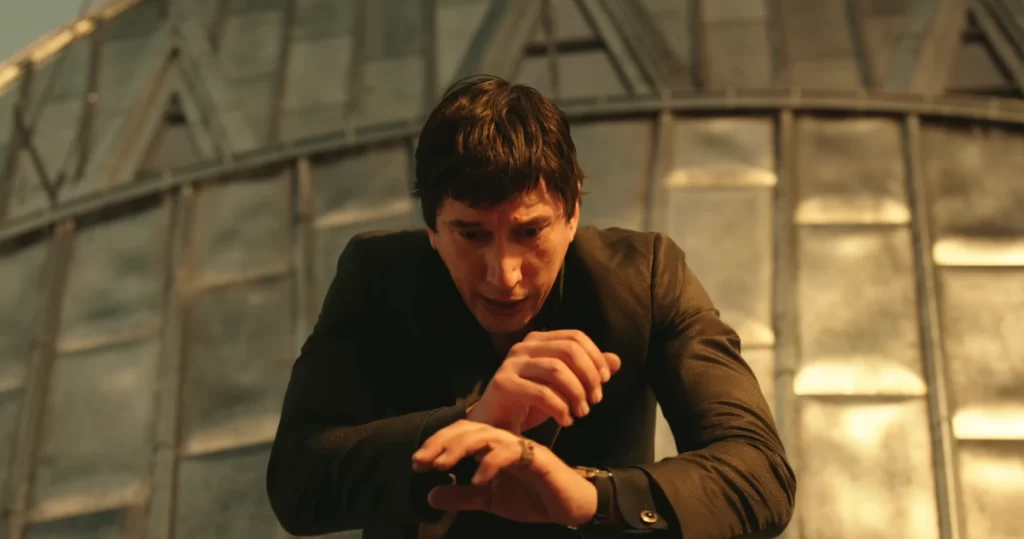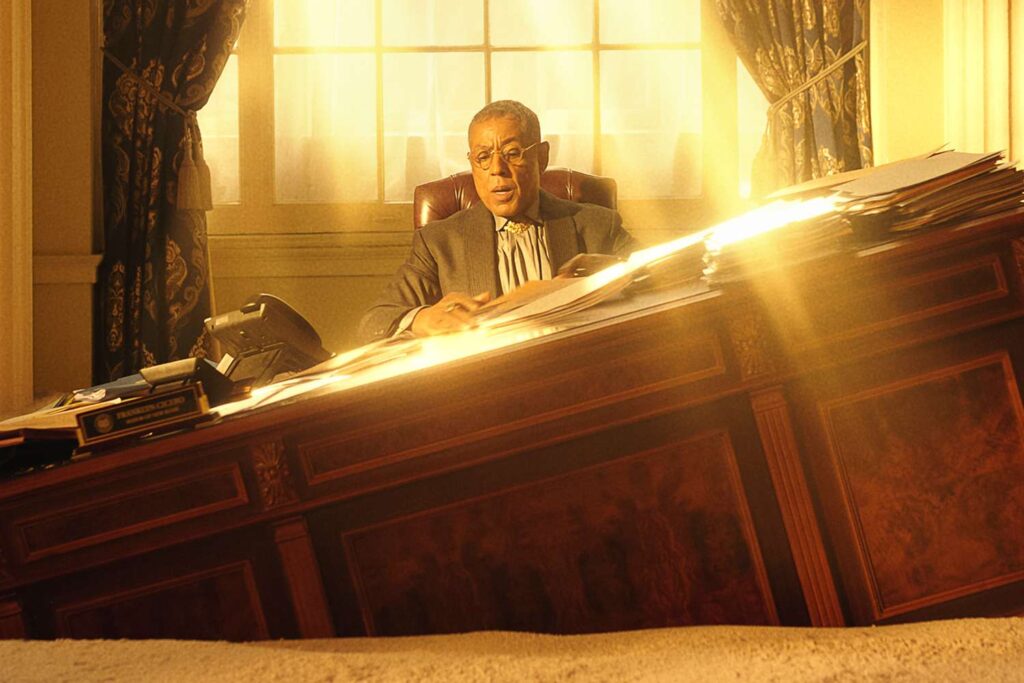
The story of Megalopolis is that of a power-drunk visionary struggling to wield his formidable artistic gifts within the constraints imposed on him by an entrenched and inflexible society. Oh, and stuff happens in the movie too.
The saga of the production of Megalopolis, the first new Francis Ford Coppola film I’ve seen in nearly 30 years, is a juicy and tawdry tale, full of hubris, chaos, and despair. It is also vastly more intriguing than the movie itself, which—for all its stately ambition and grandiloquent style—is most notable for its tedium and incoherence. It is the unhappy outcome of what appears to have been an unruly process.

It is strangely difficult to complain too sharply about Megalopolis, both as a formal conceit and as a (technically) finished product. This is unquestionably the work of an auteur—a decidedly personal passion project of the type too rarely made in today’s cautious, four-quadrant environment. (Coppola financed most of it himself, and I promise that’s the last I’ll say about its development.) But it’s also challenging to attack the picture’s failings with any specificity because, well, what even is this? Are we sure this is a movie, and not just a haphazardly assembled collection of random scenes?
Frankly, even that description might give Megalopolis too much credit. It isn’t as though the movie comprises a series of disconnected vignettes. It’s more that it has been conceived so sloppily, with such flagrant disregard for plot and character, that it can’t hope to work as a compelling narrative. I’m not sure it even wants to. Coppola seems far more invested in pushing the boundaries of his experimental method—a freewheeling technique that seems to rely heavily on improvisation and whimsy—than in telling a meaningful story or in expressing real emotions.

The (anti?) hero of Megalopolis is Cesar Catilina (Adam Driver, dressed in black and afflicted with a ghastly haircut), head of a bureaucratic agency called the Design Authority and blessed with the power to temporarily freeze time. (The particular contours and consequences of this ability are, like most of the picture, unclear to me.) Cesar fancies himself a savior—he has invented a substance called Megalon that seems to be a magical healing force—and he yearns to lead humanity into a heavenly utopia. (The setting is the mythical “New Rome,” presumably standing in for the Big Apple.) His lofty ambitions place him in conflict with the city’s traditionalist mayor, Cicero (a helpless Giancarlo Esposito), whose daughter, Julia (Nathalie Emmanuel, still waiting for a decent lead role), seems to share Cesar’s gift for manipulating space-time. Also flitting in and out of the ornate scenery are a TV personality with the hilarious name of Wow Platinum (Aubrey Plaza); a craggy old tycoon called Crassus (Jon Voight); the magnate’s disreputable nephew, Clodio (Shia LaBeouf); and Cesar’s dependable driver (Laurence Fishburne), who also serves as the film’s sporadic and ruminative narrator.
Now, did I organically absorb these crisscrossing relationships while watching Megalopolis, or did I need to resort to reading the Wikipedia summary after the fact in order to gain some semblance of understanding? There’s nothing inherently wrong with enigmatic storytelling, and kvetching about a movie’s inscrutable plot is one of the laziest forms of criticism. But the problems here go beyond the confusing writing and the clumsy editing, even if the latter task appears to have been performed with a hatchet. (Dustin Hoffman has a small role as Cicero’s wily lieutenant, only to disappear; later we learn of his death via a randomly inserted flashback.) The bigger issue is that Coppola exhibits no interest in properly defining his characters. They are all ciphers—the maverick, the sexpot, the scoundrel, the scold—and they never acquire the slightest layer of genuine personality.

Even if the whole is patchy, you might expect the individual parts of Megalopolis to be appealing, given Coppola’s innate talent. Yet on a scene-to-scene basis, the movie is largely unsatisfying. There are a few striking images, like Cicero sitting behind a tilted desk half-buried in sand, or Cesar and Julia clambering across giant rafter beams suspended in the sky. But the overall production design tends to be more mighty than persuasive, while the dialogue is silly and stilted. (When Cesar suddenly starts spouting Hamlet’s soliloquy, it’s a welcome respite that lets us briefly bask in precisely orchestrated verbiage before quickly crashing back to Coppola’s strained arrhythmia.) And despite the caliber of the cast, the actors fail to imbue the awkward material with either solemn conviction or playful camp, instead delivering halting performances that are sullen or (in Voight’s case) simply untethered from recognizable human behavior.
The modest exceptions are Plaza and (to a lesser extent) LaBeouf, who manage to embrace the lunacy of the enterprise while still standing apart from it. Perhaps that’s why the movie’s only successful sequence, both as a plot mover and on its own terms, is a ludicrous sex scene between Wow Platinum and Clodio, when Machiavellian scheming but(t)s up against base desire. Still, it isn’t exactly healthy that the picture’s most convincing exchange is “What’s that?” followed by “That’s your pussy.”

Watching Megalopolis reminded me of the episode of Seinfeld where Kramer inexplicably starts “working” at an office and submits nonsensical reports, only for his boss to tell him, “I don’t know what this is supposed to be.” But that’s not quite right, because the idea of this movie—a purported epic that fuses Shakespearean melodrama with new-age grandeur—is fairly straightforward. It’s the execution that’s faulty. Coppola has spent all of his late-period energy (and money) imagining his magnum opus; he’s spent very little of it transferring his synaptic firings to the screen with any clarity.
“The gates of Megalopolis are open!” Cesar declares triumphantly at the end of the film. It’s the most exciting moment in the movie—not because it conveys any internal meaning (what gates? where?), but because it finally gives you an opening to head for the exit.
Grade: D+
Jeremy Beck is the editor-in-chief of MovieManifesto. He watches more movies and television than he probably should.

Another stellar review, Jeremy! I love your writing, man.
Thanks very much, Jeremy! Always appreciate you reading.
[Note to anyone who happens to be randomly scanning these comments: I am not talking to myself, this is a different Jeremy, I promise.]